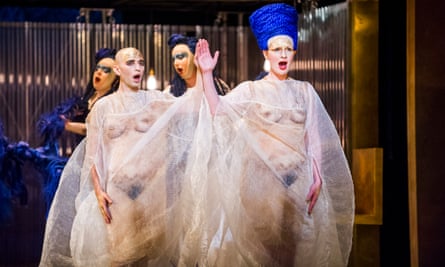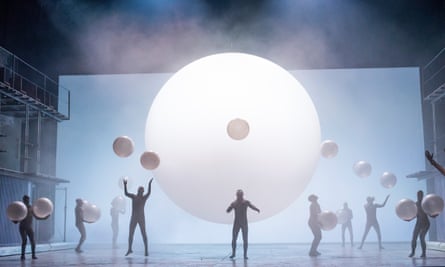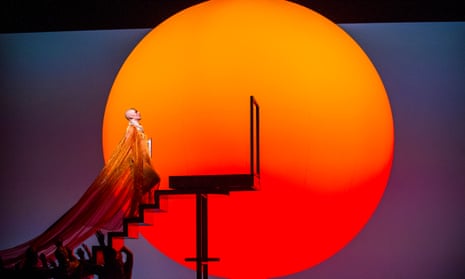Akhnaten was the first of Philip Glass’s operas to be seen in the UK when it was performed by English National Opera in 1985, a year after its Stuttgart premiere. Thirty years and more than 20 further Glass operas later, it is back at the Coliseum, in a new production by the Improbable company team of director Phelim McDermott and designers Tom Pye (sets) and Kevin Pollard (costumes). It’s a gloriously coloured, eye-catching affair, gorgeously lit by Bruno Poet, but much more concerned with creating sumptuous tableaux than McDermott’s previous ENO productions of Glass’s Satyagraha and The Perfect American.
The score is already a pretty oblique portrayal of the life and ideas of the 18th-dynasty Egyptian pharaoh, who attempted to convert his kingdom to monotheism, and whether it needs the extra layers of imagery that are loaded on it in this staging is debatable. Early Glass operas are never strong on story line, but as I remember it, there was much more sense of narrative threaded through the earlier ENO Akhnaten than there ever is here.
The texts are mostly sung in Egyptian, with only the spoken invocations (imposingly delivered by Zachary James) in English, and the parade of visual images crosses many cultural boundaries. Some of them are from ancient Egypt, but others come from more recent European traditions – Akhnaten’s coronation robe seems to have been borrowed from one of Philip II’s infantas, while James Cleverton’s Horemhab is got up like a banana-republic dictator, and Clive Bayley’s Aye could have absconded from a Mummers play.

Anthony Roth Costanzo as Akhnaten and Emma Carrington as Nefertiti. Photograph: Tristram Kenton/The Guardian
At its best, in the chorus-dominated first act, which includes Akhnaten’s coronation and his creation of the new religion, the production works like a fantastically detailed automaton, with a perfectly co-ordinated “skills group”, Gandini Juggling, supplying the perpetual movement that correlates well with the loops and repetitions of Glass’s orchestral score. As it goes on, though, the visual ideas repeat themselves and tend to swamp any dramatic ones; there are a few too many balls tossed around and clubs wielded in the later acts, at times when something a bit more substantial is needed.

But the conductor Karen Kamensek makes sure the orchestral writing is never homogenised into minimalist mush, and, as ever, the beleaguered ENO Chorus rises magnificently to every challenge it’s given. The trio of protagonists, Anthony Roth Costanza as Akhnaten, Emma Carrington as his wife Nefertiti and Rebecca Bottone as his mother Queen Tye, make the most of the characterisation their vocal lines allow, too, even if Costanza’s rather reedy, edgy counter-tenor sound won’t be to all tastes. Though this production may not quite be the revelation that Satyagraha was, it is still on its own terms a very fine piece of work, both theatrically and musically.

Comments (…)
Sign in or create your Guardian account to join the discussion